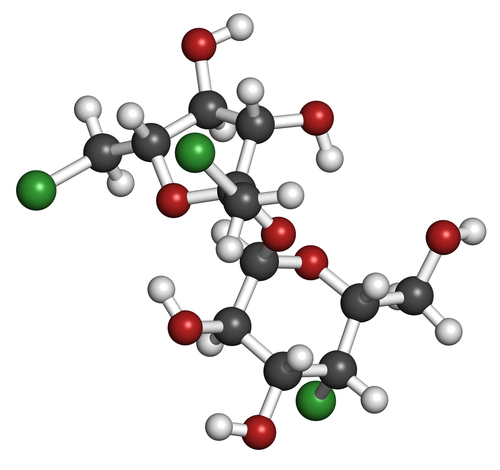Is Splenda Bad For You?
Also Known As: sucralose-based artificial sweetener
Short answer
There has been so little actual research done regarding the long-term effects of Splenda on humans that an honest answer is impossible. As with anything, it is always best to err on the side of caution.
'N' stands for neutral. Things placed into this category are (a) neither good nor bad for you, or (b) lack the necessary evidence to reach any conclusions.
View Full Grading System
Category 'A'
Very healthy and numerous health benefits. Side effects are rare. Things rated an 'A+' are typically necessary for survival (for example, water).
Very healthy and numerous health benefits. A few harmful qualities may be associated, but only under certain circumstances such as an allergic reaction.
Very healthy and numerous health benefits. Harmful qualities may be associated, but aren't usually serious.
It is important to note that even the best things in life can become bad in immoderate amounts. So, although something may be rated an 'A+', overconsumption/overdoing can bring unwanted effects.
Category 'B'
Very beneficial to your health. Things rated a 'B+' may have a few harmful qualities to pay attention to.
Overall beneficial to your health. Things rated a 'B' may have some harmful qualities to pay attention to.
More beneficial to your health than not. However, harmful qualities are most likely associated and shouldn't be overlooked.
The main difference between category 'A' and category 'B' is the harmful qualities typically present in 'B' items. Serious side effects are usually uncommon, but are still possible and should be taken note of.
Category 'C'
Both beneficial and harmful qualities associated. Things rated a 'C+' are typically a bit more on the beneficial side. Still, moderation is important.
A fairly even ratio of beneficial and harmful qualities. Moderation is important. Very general topics that can lean towards both sides of the spectrum will be placed here as well. Rice, for example, can be good or bad depending on the type.
More harmful than beneficial. Side effects are common, especially when consumed/done excessively. Moderation is very important.
Category 'C' usually denotes to both good and bad qualities. When it comes to this category, it is important to keep this word in mind: moderation.
Category 'D'
Harmful to your health. Although benefits may be associated, the bad most likely outweighs the good. Moderation is very important.
Harmful to your health. A few benefits may be associated, but the bad outweighs the good. Moderation is extremely important.
Harmful to your health. Very few, if any, benefits are present. Things in this category should be avoided as much as possible.
Category 'D' is typically for things that are more harmful than beneficial. While consuming/doing something unhealthy once in a blue moon shouldn't hurt, we definitely recommend eliminating 'D' items as a regular part of your routine/diet.
Category 'F'
Category 'F' is for things that fail to bring anything beneficial to the table, and are very harmful to your health. We recommend completely avoiding anything in this category. Long-term side effects of 'F' items are usually very serious.
Category 'N'
'N' stands for neutral. Things placed into this category are generally (a) neither good nor bad for you, or (b) lack the necessary evidence to reach any conclusions.
Long answer
Splenda is the brand name for sucralose, a substance discovered accidentally in Britain in 1976 when researchers were trying to develop a new pesticide. It is sucrose with three hydroxyl groups replaced by chlorine. There are people on both sides of the fence concerning Splenda - with neither parties having sufficient evidence to say definitively whether or not Splenda is good for humans to put in their bodies.
There are benefits to Splenda, to be sure. For one thing, consuming Splenda does not cause an insulin spike. This means that diabetics may enjoy food sweetened with the product. Also, there are no calories in Splenda, so it can help people trying to watch their calorie count.
However, don't be fooled into thinking that just because Splenda has no calories that it is the perfect ingredient for losing weight. Losing weight is not only about calorie management and sucralose may very well lead to weight gain. The reason behind this is that sucralose inhibits dopamine. Among other things, dopamine tells us if we are full or not. Consumption of sucralose may lead to overeating and weight gain. Ironically, some of those foods may contain sugars and lead to diabetes in the long-term.
Despite claims that Splenda has been extensively tested, there have been no long-term human studies done. The truth about sucralose is that we just do not know the long-term effects. New research from Duke University shows that sucralose plays a part in suppressing beneficial gut flora, something that may lead to gastrointestinal problems.
Still, it is important to keep in mind that many studies have been funded either by pro-Splenda groups or pro-sugar groups, so results have to be taken with a grain of salt. Until we get some long term studies done by non-biased groups, it is impossible to say with certainty how good or bad Splenda is for the human body.
Possible short-term side effects
- migraines
-
allergic reaction
-
seizures
-
dizziness
Possible long-term side effects
Benefits
- contains no calories
-
does not cause insulin spike
Healthier alternatives
Please turn your Ad Blocker off to see this content. Thank you!
Thank you for your feedback!
Written by Jeff Volling
Published on: 01-02-2016
Last updated: 12-10-2016
Thank you for your feedback!
Written by Jeff Volling
Published on: 01-02-2016
Last updated: 12-10-2016

 Approved by
Approved by 















